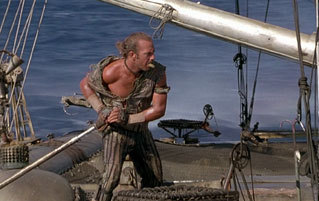How One Terrible Movie Ruined Hollywood

This Week in WTF Pop Culture History: Waterworld teaches Hollywood how to make money off of big-budget garbage.
We don't know if you've noticed, but all at once, audiences have gotten sick of Hollywood's shit -- this summer's box office is down almost 20 percent, which is a shocking number considering ticket prices are higher than ever (including the absurd premium they still charge for 3D). No movie this year made $300 million in the USA, whereas last year Iron Man 3 did over $400 million (hell, in 2012, The Avengers did an astonishing $623 million). The conventional wisdom was that while audiences love to bitch about sequels, reboots, and CGI garbage, they'll still pay to go see it. But we're finally seeing the bubble burst.
In America, anyway. What does this have to do with Waterworld? Allow us to explain.
See, while American audiences have finally gotten sick of superheroes and CGI-heavy reboots, audiences in China and elsewhere have not -- overall profits are going to be higher than ever thanks to foreign ticket sales. That's bad news for people who have grown to hate modern blockbusters, as we explained in detail here:
"Foreign audiences also aren't as picky about good writing (a lot of it will be lost in the translation to subtitles anyway) or clever comedy (which is highly culturally specific). So if you're a studio executive who is choosing between financing a poignant coming of age film about an orphan ranch hand in East Texas or a film about a giant radioactive thunderstorm that gives people superpowers, chances are you're not going to go with the poignancy."

Just to be clear, we're not trying to say that foreign audiences have shitty/simplistic taste in movies; it's just that only a certain type of movie works in every country: big, effects-heavy action spectacles (it's no coincidence that the most popular foreign-language film in American history was the kung fu extravaganza Crouching Tiger, Hidden Dragon). But, more importantly, Hollywood realized a while ago that a terrible movie with a clunky script and weird performances could still make big cash overseas as long as they threw enough stunts and effects at the screen. It's led to a cultural low point in cinema (and is apparently driving all of the best talent to TV instead). And it all goes back to one movie:

This week in 1995, the entire entertainment industry was talking about what was shaping up to be the biggest bomb in film history. Waterworld was originally budgeted for $100 million, but ran over to the point that it wound up costing $175 million -- making it the most expensive film ever made (it'd be $270 million in today's money). Despite the allure of watching Kevin Costner drink his own urine while trading hackneyed dialogue with a snarling Dennis Hopper with an eye patch, the film failed to ignite the imagination of American audiences, and Kevin Costner was politely asked to never headline a big budget film ever again.
Waterworld somehow managed to hold on to the No. 1 spot at the box office for two barren, miserable weeks wherein the only other offerings at the local multiplex were Sandra Bullock doing 1990s computer magic and indicating she'd had sex with Dennis Miller at one point in her life in The Net and Danny Glover and Denis Leary trying their hardest not to swear in Operation Dumbo Drop (the following week's release of the Daniel Stern comedy Bushwhacked also failed to unseat Costner's ponderously expensive sci-fi love letter to himself).
Waterworld became a cautionary tale/punchline for years after, because everyone forgets the most important part of the story:
It made its money back.

"You gotta be shittin' me."
Oh, it only made $88 million in the USA (catastrophic, considering the budget was twice that), but it made an astounding $175 million overseas, where delighted audiences ignored the bullshit going on in the subtitles and just watched the stunts and jet ski chases. So for the movie studios, the lesson wasn't "Maybe we shouldn't throw nine figures at a movie whose script is just a scribbled drawing of a catamaran on a stained napkin." It was "Man, these assholes will watch anything!"
You have to understand that this was all new -- a few decades ago, American movies rarely got an extensive worldwide theatrical release. First of all, it's expensive to do -- this was back in the days when films only came on reels, and those reels cost a few thousand dollars each to produce -- so you had millions in distribution costs even before you added in things like promotion and translation for each market the film was going to get released in. Most studios just assumed that China wasn't interested enough in Lethal Weapon 2 to make it worth it, so they didn't bother to risk the millions of dollars it would've cost to put Riggs and Murtaugh in Chinese theaters.
As a result, blockbusters like Ghostbusters, The Goonies, and Back to the Future only saw worldwide releases after they became huge hits in America. Even guaranteed successes like E.T., Raiders of the Lost Ark (and its sequels), and even freaking Batman only debuted in foreign-language markets after they'd already made a king's ransom in the domestic box office. In other words, opening a movie in a foreign country used to be what studios would do to extend the box office life of an already minted hit. An afterthought.

But in the early '90s, all that started to change. Steven Spielberg's critically maligned Hook drastically underperformed expectations in America, yet still went on to be one of the biggest hits of the year thanks to its worldwide release -- two-thirds of its gross came from foreign ticket sales. Kevin Costner's Robin Hood: Prince of Thieves was a massive hit overseas, which arguably influenced the studio's decision to push Waterworld into foreign markets once it became clear that America did not want to accompany Kevin on his aquatic adventure. But to be clear, neither of those were going to be financial disasters -- Hook was made on a scant budget of $70 million. Waterworld had the potential to be the kind of money-sucking black hole that drives studios into bankruptcy.
Fast forward to today, and foreign box office is all that matters -- American studios are beginning to release their films overseas before releasing them in the United States, and as we recently discussed, Transformers: Age of Extinction is currently the biggest movie of all time in China, its worldwide gross now three times what it made at American theaters (it just passed the $1 billion mark worldwide). If you're wondering why so many blockbusters seem to be a nonsensical string of disconnected CGI-heavy set pieces, that's why.
And we're not even sure we have a right to complain. Like unemployment and high gas prices, this is another complaint that is really just about globalization -- the fact that the rest of the world is getting a taste of what the West has had, and the inescapable fact that our culture has to change to cater to theirs. We joked that surely the Chinese would never want to nuke the people who gave them Transformers, but we're just barely joking -- maybe having a unified world enjoying the same stories will be what saves us, at least until the ice caps melt and flood the globe.
